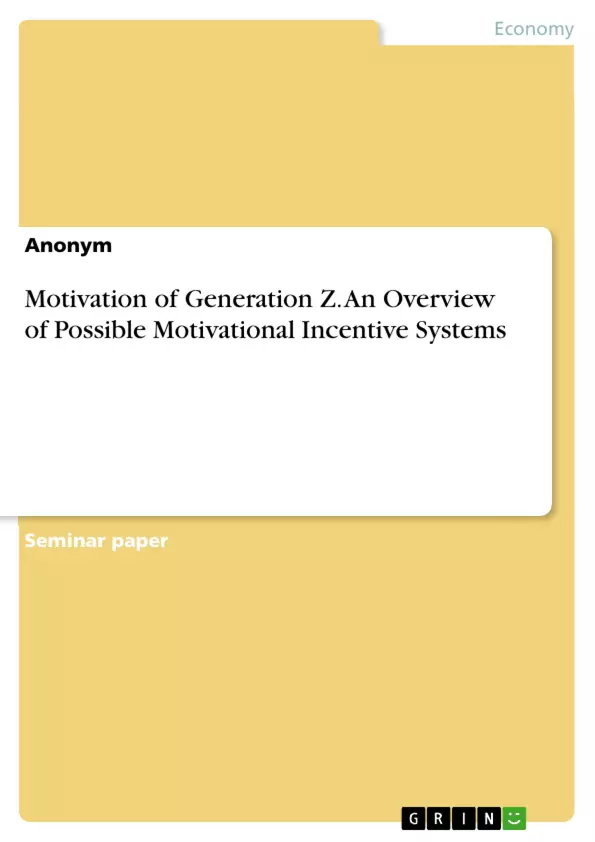This paper aims to investigate possible motivational incentive systems and motivation that show international companies how to implement and develop business models that meet generation Z's requirements. In the beginning, the requirements of generation Z are being derived. This is a base for next step where possible motivational incentive systems are being presented for companies and management. The following part will start with the theoretical and conceptional basics, followed by the definition of motivation in a professional context and Alderfer's ERG (Existence, Relatedness and Growth) theory. There will be a description of each individual generation on the labor market, which leads into possible motivational incentive systems for companies deriving on case studies. Following on this, there is a discussion of today's challenges that companies are facing. The paper will end with a summary of this work, a critical review and gives an outlook.
Inhaltsverzeichnis (Table of Contents)
- Introduction
- Problem definition
- Goal and structure of work
- Theoretical and conceptional background
- Motivation in a professional context
- Alderfer's ERG-theory
- Generations on the labor market
- Generation baby boomer
- Generation X
- Generation Y
- Generation Z
- Details of generation Z
- Examples of application
- First example of application
- Second example of application
- Incentive systems
- Management of a company
- Supervisor
- Review results for open discussion
Zielsetzung und Themenschwerpunkte (Objectives and Key Themes)
This scientific work aims to investigate into possible motivational incentive systems and motivation that show international companies of how to implement and develop business models that meet generations Z's requirements. The work aims to derive the requirements of generation Z, present possible motivational incentive systems for companies and management, and discuss today's challenges that companies are facing.- Motivational incentive systems for generation Z
- The requirements of generation Z
- Alderfer's ERG theory
- The impact of generations on the labor market
- Challenges faced by companies in adapting to generation Z
Zusammenfassung der Kapitel (Chapter Summaries)
- Chapter 1 introduces the concept of generation Z and its impact on the labor market. The chapter highlights the unique challenges faced by generation Z, including rapid industrialization, digitalization, and climate change disasters. It also discusses the need for employers to adapt to the demands of this generation.
- Chapter 2 delves into the theoretical and conceptual background of motivation. It defines motivation in a professional context and presents Alderfer's ERG theory as a framework for understanding employee motivation. The chapter also provides an overview of the different generations on the labor market and their characteristics.
- Chapter 3 provides specific examples of how to apply motivational incentive systems in different contexts. These examples illustrate practical strategies for companies to implement and develop business models that meet the needs of generation Z.
- Chapter 4 focuses on the management of a company and the role of supervisors in implementing motivational incentive systems. It discusses the importance of understanding generation Z's values and expectations to create a positive and productive work environment.
Schlüsselwörter (Keywords)
This research focuses on motivational incentive systems, generation Z, Alderfer's ERG theory, and the impact of generations on the labor market. It explores key themes such as the need for companies to adapt to the demands of generation Z, the role of motivation in a professional context, and the challenges faced by companies in managing different generations.Frequently Asked Questions
What is the main objective of this study on Generation Z?
The goal is to investigate motivational incentive systems that help international companies adapt their business models to meet the specific requirements of Generation Z.
Which psychological theory is used to explain motivation in this paper?
The paper uses Alderfer's ERG theory, which categorizes human needs into Existence, Relatedness, and Growth.
What are some unique challenges faced by Generation Z?
Generation Z has grown up with rapid industrialization, pervasive digitalization, and the immediate threat of climate change, which shapes their values and workplace expectations.
How does Generation Z differ from previous generations like Baby Boomers or Gen X?
The paper describes each generation on the labor market to highlight Gen Z's distinct requirements regarding work-life balance, digital integration, and purpose-driven work.
What is the role of supervisors in motivating Generation Z?
Supervisors need to understand Gen Z's specific values and expectations to implement effective incentive systems and create a positive work environment.
Does the paper provide practical examples of incentive systems?
Yes, the work includes application examples and case studies to illustrate how companies can practically implement these motivational strategies.
- Quote paper
- Anonym (Author), 2022, Motivation of Generation Z. An Overview of Possible Motivational Incentive Systems, Munich, GRIN Verlag, https://www.hausarbeiten.de/document/1372821


